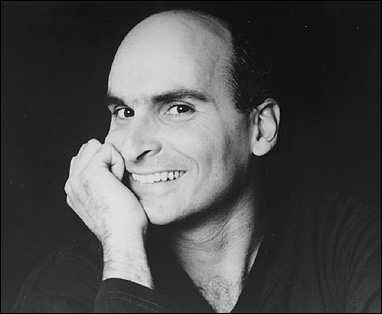![]()
Departments
![]()

|
Week of 13 November 1998 |
Vol. II, No. 14 |
Feature
Article
The Whiting's on the wall
Lombreglia brings home $30,000 writing prize
by Eric McHenry
The Mrs. Giles Whiting Foundation didn't heed the title of Ralph Lombreglia's most recent short story collection, Make Me Work.
In fact, the $30,000 writer's award the foundation recently conferred upon him will liberate Lombreglia from much of the freelance work he's had to do in the past.
"I intend to make sure that the money attached to this award has a real impact on my productivity as a fiction writer," says Lombreglia, who each spring since 1995 has taught a course on the novella in BU's graduate Creative Writing Program. For several years, he says, he's sacrificed some of that productivity for income from freelance jobs -- book reviewing, column writing, script consultation for public television, graphic design, and Web site construction. "I'm going to put those things to the side," he says, "and commit more time to programming the greatest computer there ever was: the brain." Lombreglia, who intends to continue teaching at BU, is currently at work on a novel tentatively titled Queen of Heaven.
The Whiting award goes annually to 10 young and emerging writers of fiction, poetry, creative nonfiction, and plays. A substantial purse and a history of prescient picks have earned it a reputation as one of writing's top honors. A roll call of past recipients includes such names as David Foster Wallace, Tobias Wolff, Tony Kushner, C. D. Wright, Stanley Crouch, and Allegra Goodman, who is also a member of BU's graduate creative writing faculty. Lombreglia was one of only two fiction authors selected by the Whiting Foundation this year. Notification of the award, he says, caught him completely off guard.
"They consider you in secret, so you don't know you're up for the award. At one point about five months ago my book editor called me up and said, 'Don't ask me for details, but you've been nominated for something.' "
The jury was familiar with Lombreglia's two books of short stories, Make Me Work (Farrar, Straus & Giroux, 1994) and Men Under Water (Doubleday, 1990), but wanted to see something more recent. Through his editor, Lombreglia passed along a 60-page excerpt from his novel-in-progress.
"Then I put it completely out of my mind," he says. "It could have been any number of things. I had absolutely no inkling that I was being considered for a Whiting."
Products of the program
The award is another feather in the cap of BU's
distinguished Creative Writing Program, which includes Nobel
Laureate Derek Walcott and U.S. Poet Laureate Robert Pinsky.
Goodman, who began teaching in the program this year, is a
finalist for the National Book Award for fiction.
|
|
|
Ralph Lombreglia
Photo by Mikki Ansin
|
Lombreglia, who since 1996 has written a semiregular column called "Digital Culture" for The Atlantic Monthly's site on the World Wide Web, is something of a technophile. Electronic media have been a motif in his fiction and serve as a plot foil in the new novel. His stories, which have appeared in such prestigious publications as The New Yorker and the annual Best American Short Stories anthology, are also known for their wry humor. He says Queen of Heaven contains some of that, too.
"How, really, can you write a fairly ambitious longer work without drawing on some of the main things that interest you?" he says. "There are some funny moments in this novel -- I hope they're funny, anyway. There's always a kind of undercurrent of sweetly ironic, wry comedy going on with the main character, Josephine. But that comedy definitely has a deeper, darker edge. It's not knee-slapping stuff."
A statue of limitation
He describes an episode: Josephine, dissatisfied with the
exploitative relationships that pervade her life, is trying
to sell her house and leave town. She takes her
superstitious mother-in-law's suggestion to bury a statue of
St. Joseph in the yard, believing that it will help attract
buyers.
"But the ground is frozen and she's having trouble digging the hole," says Lombreglia. "Finally she gets it buried in the backyard and calls her mother-in-law triumphantly to announce that she's done it. And her mother-in-law says, 'No, you can't bury it in the backyard. It has to be in the front yard.' And she has to dig it up and bury it again. By this time all of her neighbors are watching her.
"The book has a definite comic component," he says, "but it's not slapstick. The reason she's burying it in the first place is kind of unsettling: there's a sadness below the comedy."
Lombreglia believes his experience teaching longer fiction at BU has informed the writing of what, although it is not yet under contract, will almost certainly be his first published novel. (He wrote one in the late 1980s that has not yet seen publication.) The workshop requires students to turn in, over the course of the semester, three installments of a 90-page novella.
"Short stories are demanding in their own way," he says, "but there's a different set of muscles that comes into play when you decide to write something more substantial. I think that reacting to other people's longer work, talking about the different pacing, the different dramatic and emotional needs of the novella -- all of this has definitely helped me think about my own project."
The BU Creative Writing Program's Annual Faculty Reading, featuring Leslie Epstein, David Ferry, Allegra Goodman, George Higgins, Ralph Lombreglia, Robert Pinsky, Derek Walcott, and Rosanna Warren, will take place at 8 p.m. on Monday, November 16, at the BU Playwrights' Theatre. For more information, call 353-2510.
